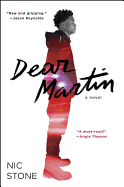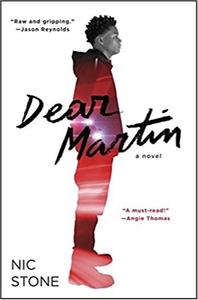
 Of course high school senior Justyce knows who Dr. Martin Luther King, Jr. was--he's one of "only eight black kids" at Braselton Preparatory Academy in Atlanta. But Justyce hasn't spent much time thinking about Dr. King and doesn't consider himself one of "THOSE black guys." When he's assaulted by a police officer for helping a drunk girl at a party, however, he realizes that the world sees him differently than he sees himself; he starts looking to Dr. King for guidance because he "can't continue to pretend nothing's wrong." Justyce writes to Martin, as he calls him, throughout the fall, puzzling over the world he's been born into and his relationship to it as a young black man. His letters punctuate most chapters in the first part of the book, as Justyce processes difficult conversations in school and with friends of both races; they track his mixed emotions when he's accepted early to Yale and a classmate who didn't get in says, "I know for a fact it's because I'm white and he's black." Writing to Martin gives Justyce a measure of comfort through everything, even his girl troubles--but after an off-duty white cop shoots at him and kills his best friend, even Martin's words are powerless in the face of what's to come.
Of course high school senior Justyce knows who Dr. Martin Luther King, Jr. was--he's one of "only eight black kids" at Braselton Preparatory Academy in Atlanta. But Justyce hasn't spent much time thinking about Dr. King and doesn't consider himself one of "THOSE black guys." When he's assaulted by a police officer for helping a drunk girl at a party, however, he realizes that the world sees him differently than he sees himself; he starts looking to Dr. King for guidance because he "can't continue to pretend nothing's wrong." Justyce writes to Martin, as he calls him, throughout the fall, puzzling over the world he's been born into and his relationship to it as a young black man. His letters punctuate most chapters in the first part of the book, as Justyce processes difficult conversations in school and with friends of both races; they track his mixed emotions when he's accepted early to Yale and a classmate who didn't get in says, "I know for a fact it's because I'm white and he's black." Writing to Martin gives Justyce a measure of comfort through everything, even his girl troubles--but after an off-duty white cop shoots at him and kills his best friend, even Martin's words are powerless in the face of what's to come.
In her first novel, Nic Stone uses debate team-captain Justyce's irrepressible curiosity and righteous anger to guide the reader through a nuanced examination of prejudice and racial injustice. Because Justyce lives at the intersection of several identities, he is able to understand every side of each incident--even those he opposes--and Stone's realistic writing brings both his confusion and hard-won clarity to life. Stone combines different formats (like screenplay formatting for conversations) with teenage language (such as "prolly" in place of probably) to keep the story accessible, and she never shies away from deep engagement with the ramifications of racism. In particular, heated classroom debate allows her to introduce many mainstream objections to social justice movements as well as concise takedowns without ever detracting from the overarching story of Justyce's senior year: "So you're saying people just need to pull themselves up by their bootstraps?... In order to do that, they have to be able to afford boots." As a result, while the plot grows increasingly painful, it is never too heavy to bear, and contemporary teens will be delighted to speed through a book by an author who so clearly respects their voices and concerns. --Stephanie Anderson, assistant director of selection, BookOps, Brooklyn Public Library and the New York Public Library
Shelf Talker: A bold, character-driven debut that centers on teens and their experience of the struggle for racial justice in the United States.

